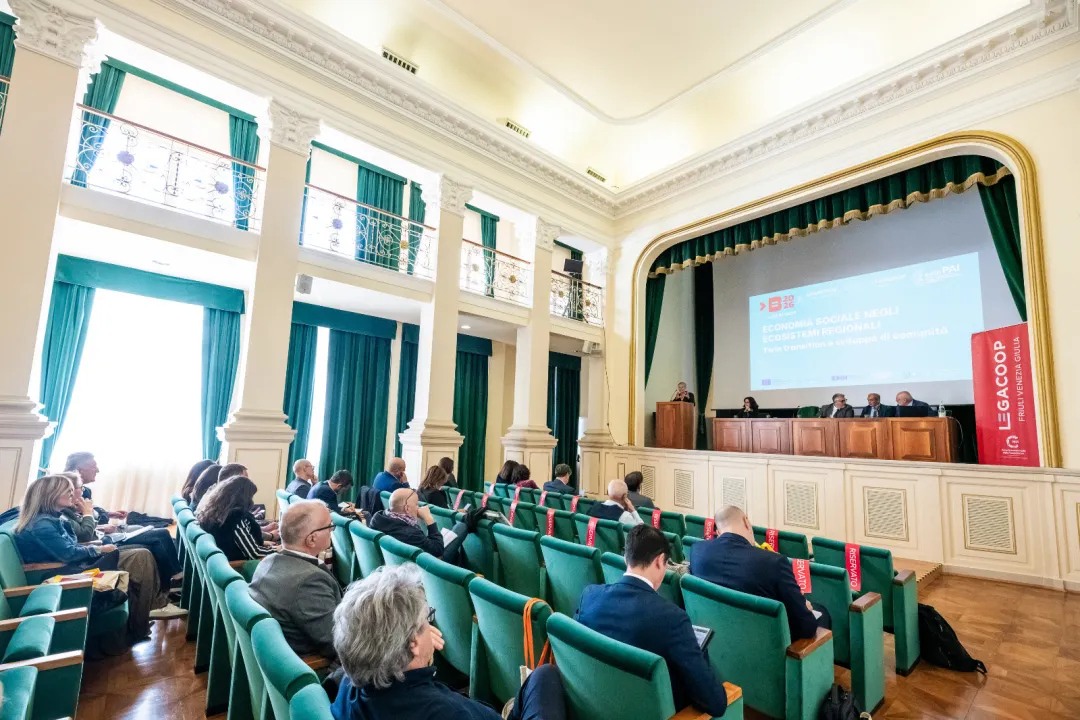Social economy conference highlights potential for regional revitalisation
The social economy is a driver of innovation, employment and service provision, but it faces a visibility challenge that requires a shared narrative recognising its full contribution across Europe’s rural and regional territories. This headline message emerged from a dedicated social economy conference of 3 October in Gorizia, Italy.

Image by Legacoop Friuli Venezia Giulia
Titled ‘Social economy in regional ecosystems: twin transition and community development’, the conference brought together representatives of the European Commission, regional governments, academia, cooperative federations, and civil society organisations. Focused on how the social economy supports the green and digital transitions while strengthening community ties and regional ecosystems, the event exchanged experiences on integrating social, environmental and economic objectives in territorial development.
The Rural Pact: empowering regions and social economy actors
Rural Pact Support Office Policy Analyst Patricia Martínez Sáez outlined the role of the Rural Pact as both a political and practical platform for regional authorities and social economy actors to connect local initiatives with EU policy. Through its online Community platform, stakeholders can connect with peers, share good practices and experiences by joining a dedicated discussion group on the social economy.
By engaging with and through the Pact, regional authorities and cooperative networks can make their voices heard on how rural funding and governance evolve, ensuring that the twin transition remains inclusive, place-based and community driven.
Against a broader EU background, the social economy is considered a key driver across the four pillars of the EU rural vision: stronger; connected; resilient; and prosperous, with cooperatives creating jobs and services in areas underserved by traditional markets.
Regional examples, such as the Flemish Rural Pact, Andalusia’s integrated rural strategy, and Catalonia’s rural coordination structures, illustrate how the Pact can be adapted to local contexts, embedded in policy, and used to drive measurable, place-based impact.
Role of the social economy in regional and rural revitalisation
The conference highlighted the pivotal role of the social economy in driving inclusive, sustainable, and resilient regional development. Cooperative and social-economy enterprises were showcased as essential actors in providing jobs, services, and community-led solutions across renewable energy, care, and social and digital innovation.
Regional strategies, from Murcia’s integrated cooperative ecosystem to Turin’s Metropolitan Plan for the social economy, illustrated how multi-level governance, coordinated policy, and targeted funding can strengthen social-economy ecosystems. Digital platforms like the Open Food Network and renewable-energy communities demonstrated how technology, sustainability, and citizen participation can transform local food systems and energy production while supporting the twin green and digital transitions.
The event emphasised the complementarity of EU instruments – the Social Economy Action Plan, Rural Action Plan, and Rural Pact – in providing frameworks, tools, and networks that enable regional and local actors to implement integrated, place-based development strategies. These strategies help ensure both economic and social vitality for rural and metropolitan communities.
The conference was organised by Legacoop Friuli Venezia Giulia, in cooperation with the Diesis Network, Legacoop Lombardia and the European Digital Innovation Hub.